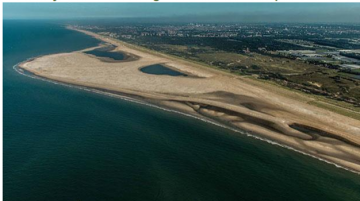Case study:Sandscaping: Difference between revisions
(Created page with "{{Case study status |Approval status=Draft }} {{Location |Location=51.991502113400976, 4.339316416320344 }} {{Project overview |Project title=Sandscaping |Status=Complete |The...") |
No edit summary |
||
| Line 6: | Line 6: | ||
}} | }} | ||
{{Project overview | {{Project overview | ||
|Status=Complete | |Status=Complete | ||
|Project web site url=www.therrc.co.uk//sites/default/files/files/riverwiki/65_sandengine.pdf | |||
|Themes=Economic aspects, Flood risk management, Habitat and biodiversity, Monitoring, Social benefits | |Themes=Economic aspects, Flood risk management, Habitat and biodiversity, Monitoring, Social benefits | ||
|Country=Netherlands | |Country=Netherlands | ||
| Line 14: | Line 14: | ||
|Contact organisation=Royal HaskoningDHV | |Contact organisation=Royal HaskoningDHV | ||
|Contact organisation url=www.royalhaskoningdhv.com/ | |Contact organisation url=www.royalhaskoningdhv.com/ | ||
|Partner organisations=Rijkswaterstaat, Province of Zuid-Holland, The Crown Estate, Van Oord, HR Wallingford, Arup | |||
|Multi-site=No | |Multi-site=No | ||
|Project picture=65 Sandscaping.png | |||
|Project summary=Sandscaping is an innovative coastal management approach, inspired by the Dutch Zandmotor (Sand Engine) (Photo 1 and Map 1)). It involves placing a large volume of sediment to benefit one location, designing it so that natural processes move the sediment to other places where it is needed. In the right place and if designed well, the large volume and concentrated placement can reduce costs, while the scale and dynamic nature can generate benefits for amenity, tourism and habitats. | |||
A partnership of organisations has been exploring the implementation of Sandscaping in the UK. There is a long list of high potential sites currently being developed with local partners (Map 2). | |||
The Dutch Zandmotor is a nourishment of 21.5 million m3, intended to last for 20 years. Monitoring over the first 5 years shows it is likely to function longer, up to 30 years. Economies of scale reduced the cost per m3 by about 50% from normal scale nourishments. In addition, the Zandmotor has become the most popular location for kite surfing in the Netherlands. | |||
|Project title=Sandscaping | |||
}} | }} | ||
{{Image gallery}} | {{Image gallery}} | ||
Revision as of 16:28, 8 November 2018
This case study is pending approval by a RiverWiki administrator.
Project overview
| Status | Complete |
|---|---|
| Project web site | http://www.therrc.co.uk//sites/default/files/files/riverwiki/65_sandengine.pdf |
| Themes | Economic aspects, Flood risk management, Habitat and biodiversity, Monitoring, Social benefits |
| Country | Netherlands |
| Main contact forename | Jaap |
| Main contact surname | Flikweert |
| Main contact user ID | |
| Contact organisation | Royal HaskoningDHV |
| Contact organisation web site | http://www.royalhaskoningdhv.com/ |
| Partner organisations | Rijkswaterstaat, Province of Zuid-Holland, The Crown Estate, Van Oord, HR Wallingford, Arup |
| Parent multi-site project | |
| This is a parent project encompassing the following projects |
No |
Project summary
Sandscaping is an innovative coastal management approach, inspired by the Dutch Zandmotor (Sand Engine) (Photo 1 and Map 1)). It involves placing a large volume of sediment to benefit one location, designing it so that natural processes move the sediment to other places where it is needed. In the right place and if designed well, the large volume and concentrated placement can reduce costs, while the scale and dynamic nature can generate benefits for amenity, tourism and habitats.
A partnership of organisations has been exploring the implementation of Sandscaping in the UK. There is a long list of high potential sites currently being developed with local partners (Map 2).
The Dutch Zandmotor is a nourishment of 21.5 million m3, intended to last for 20 years. Monitoring over the first 5 years shows it is likely to function longer, up to 30 years. Economies of scale reduced the cost per m3 by about 50% from normal scale nourishments. In addition, the Zandmotor has become the most popular location for kite surfing in the Netherlands.
Monitoring surveys and results
Lessons learnt
Image gallery
|
Catchment and subcatchment
Site
Project background
Cost for project phases
Reasons for river restoration
Measures
MonitoringHydromorphological quality elements
Biological quality elements
Physico-chemical quality elements
Any other monitoring, e.g. social, economic
Monitoring documents
Additional documents and videos
Additional links and references
Supplementary InformationEdit Supplementary Information
| ||||||||||||||||||||||||||||||||||||||||||||||||||||||||||||||||||||||||||||||||||||||||||||||||||||||||||||||||||||||||||||||||||||||||||||||||||||||||||||||||||||||||||||||||||

